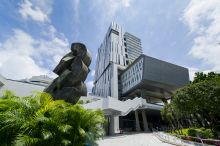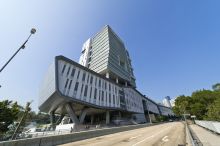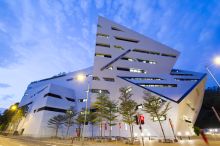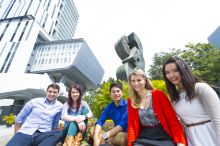|
Programme Core Courses (6 credit units)#
|
|
For Stream 1: Sociology, Stream 2: Criminology, and Stream 3: Family Conflict Resolution and Mediation, students are required to take 2 Programme Core Courses (6 credit units)
|
|
SS5302 Research Methods in Social Sciences
|
3
|
|
SS5426 Social Problems
|
3
|
|
For Stream 4: Clinical Mental Health Practice, students are required to take 2 Programme Core Courses (6 credit units)
|
|
SS5803 Psychopathology
|
3
|
|
SS5837 Community Mental Health: Theory and Practice
|
3
|
|
Stream#
|
|
Students are required to specialize in one stream and take the required credits of courses from their chosen stream
- Stream 1: Sociology
- Stream 2: Criminology
- Stream 3: Family Conflict Resolution and Mediation
- Stream 4: Clinical Mental Health Practice
|
|
Stream 1: Sociology (24 credits units)
|
|
i) Programme Core Courses (Students are required to take 5 courses (18 credit units))
|
|
|
3
|
- SS5401 Social Science Perspectives
|
3
|
- SS5423 Programme Design & Evaluation
|
3
|
- SS5428 Applied Social Statistical Analysis
|
3
|
- SS6591 Integrative Project
|
6
|
|
ii) Programme Electives (Students are required to take any 2 courses (6 credit units))
|
- SS5204 Penology & Rehabilitation of Offenders
|
3
|
- SS5303 Criminal Justice in Hong Kong and the Pacific
|
3
|
- SS5304 Psychology and Crime
|
3
|
|
|
3
|
- SS5316 Aggressive Behavior and Homicide
|
3
|
- SS5427 Special Topics in Applied Sociology
|
3
|
|
Stream 2: Criminology (24 credit units)
|
|
i) Programme Core Courses (Students are required to take 6 courses (21 credit units))
|
- SS5204 Penology & Rehabilitation of Offenders
|
3
|
- SS5301 Advanced Theories in Criminology
|
3
|
- SS5303 Criminal Justice in Hong Kong and the Pacific
|
3
|
- SS5304 Psychology and Crime
|
3
|
|
|
3
|
- SS6308 Master’s Thesis in Criminology
|
6
|
|
ii) Programme Electives (Students are required to take any 1 course (3 credit units))
|
- SS5316 Aggressive Behavior and Homicide
|
3
|
- SS5423 Programme Design & Evaluation
|
3
|
- SS5427 Special Topics in Applied Sociology
|
3
|
- SS5428 Applied Social Statistics Analysis
|
3
|
|
Stream 3: Family Conflict Resolution and Mediation (27 credit units)
|
|
i) Programme Core Courses (Students are required to take 7 courses (24 credit units))
|
- SS5812 Negotiation and Mediation in Work
|
3
|
- SS5824 Domestic Violence: Prevention and Treatment
|
3
|
- SS5825 Marital Preparation, Enrichment and Therapy
|
3
|
- SS5827 Family Mediation: Theory and Practice
|
3
|
- SS5828 Family Mediation Laboratory
|
6
|
- SS5829 Ethics and Legal Issues of Family Conflict Resolution and Mediation
|
3
|
- SS6403 Master’s Integrative Project in Family Conflict Resolution and Mediation
|
3
|
|
ii) Programme Electives (Students are required to take any 1 course (3 credit units))
|
- SS5110 Assessment and Interventions in Mental Health Counselling
|
3
|
- SS5208 Cognitive-behavioural Interventions
|
3
|
|
|
3
|
- SS5821 Counselling Children and Youth
|
3
|
|
Stream 4: Clinical Mental Health Practice (24 credit units)
|
|
i) Programme Core Courses (Students are required to take 6 courses (18 credit units))
|
- SS5110 Assessment and Interventions in Mental Health Counselling
|
3
|
- SS5836 Diagnostic Assessment and Medical Treatment in Mental Disorders
|
3
|
- SS5838 Mental Health Crisis Intervention and Resolution
|
3
|
- SS5839 Working with Child and Adolescent Mental Health
|
3
|
- SS5840 Dementia Care and Mental Health Counselling for Older People
|
3
|
- SS6404 Master’s Integrative Project in Clinical Mental Health Practice
|
3
|
|
ii) Programme Electives (Students are required to take any 2 courses (6 credit units))
|
- SS5208 Cognitive-behavioural Interventions
|
3
|
- SS5216 Contemporary Intervention Approaches
|
3
|
- SS5302 Research Methods in Social Sciences
|
3
|
|
|
3
|
- SS5801 Counselling in Society and Across Culture
|
3
|
- SS5825 Marital Preparation, Enrichment and Therapy
|
3
|






